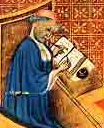| Profile | Major Works | Resources |
Nicholas Oresme, c.1320-1382.

Nicolas Oresme (sometimes Nicole de Oresme or Nicolaus Oresmus) was a Medieval French Scholastic philosopher, mathematician and scientist.
Originally of humble background from Normandy, Oresme studied theology with Jean Buridan in Paris. Oresme was enrolled in the royal-subsidized College of Navarre in Paris, acquiring his master of arts before 1348 and made master of theology around 1356. He remained as grand master of the College of Navarre until around 1361, when he became a canon and later dean of the cathedral of Rouen. In Christmas 1363, he pronounced an energetic discourse, denouncing ecclesiastical luxury and corruption, before the Pope Urban V and the Sacred College in Avignon, that nearly got him accused of heresy (the discourse was frequently reproduced by later Protestant writers). He wrote numerous treatises against astrology, a series of summaries of natural sciences and a significant christological treatise, De communicatione idiomatum. Oresme is commonly credited as one of the prime developers of a "clockwork" theory of the universe, and an inventor and avid user of longitudinal plots and bar charts.
Around 1360, Oresme became a confessor and counsellor of the Dauphin Charles (future King Charles V of France), and was commissioned by the king, around 1370, to undertake translations of several of Aristotle's works, notably his Ethics, Politics and Economics into vernacular French (albeit from the Latin translations, rather than the Greek original). Oresme was made Bishop of Lisieux in 1377 and a French translation of the Bible is credited to him (although now known to be spurious). A mathematician and originator of the "clockwork" theory of the universe.
Oresme has three economics-related works - his commentary on the Ethics, his commentary on the Politics and Economics and his celebrated 1373 treatise on coinage. It is the last of these that contain his most original insights.
In his commentaries on the Ethics, Oresme finds Ancient Greek and Medieval Christian morality largely in agreement. From the Politics, he discerns that monarchy is the ideal government, while oligarchy and democracy are less desirable. And from Economics, Oresme concludes that the pater familias is master, his wife a servant and slaves are mere brutes.
In his famous 1373 monetary work, Oresme articulated a succinct version of the "metallic" theory of inflation. In particular, his linked inflation to the (perennial) habit of European prince to debasing the currency. Oresme accepted that the government was entitled to a modest seignorage gain, not only for the pure costs of minting, but also because coins had a "usefulness" (e.g. portability, wide acceptability, etc.) beyond their pure metal content. Oresme condemned "alterations" in the value of existing money (i.e. debasement) as simple theft.
|
Major Works of Nicole Oresme
|
|
Resources on Nicholas Oresme
|
All rights reserved, Gonçalo L. Fonseca
